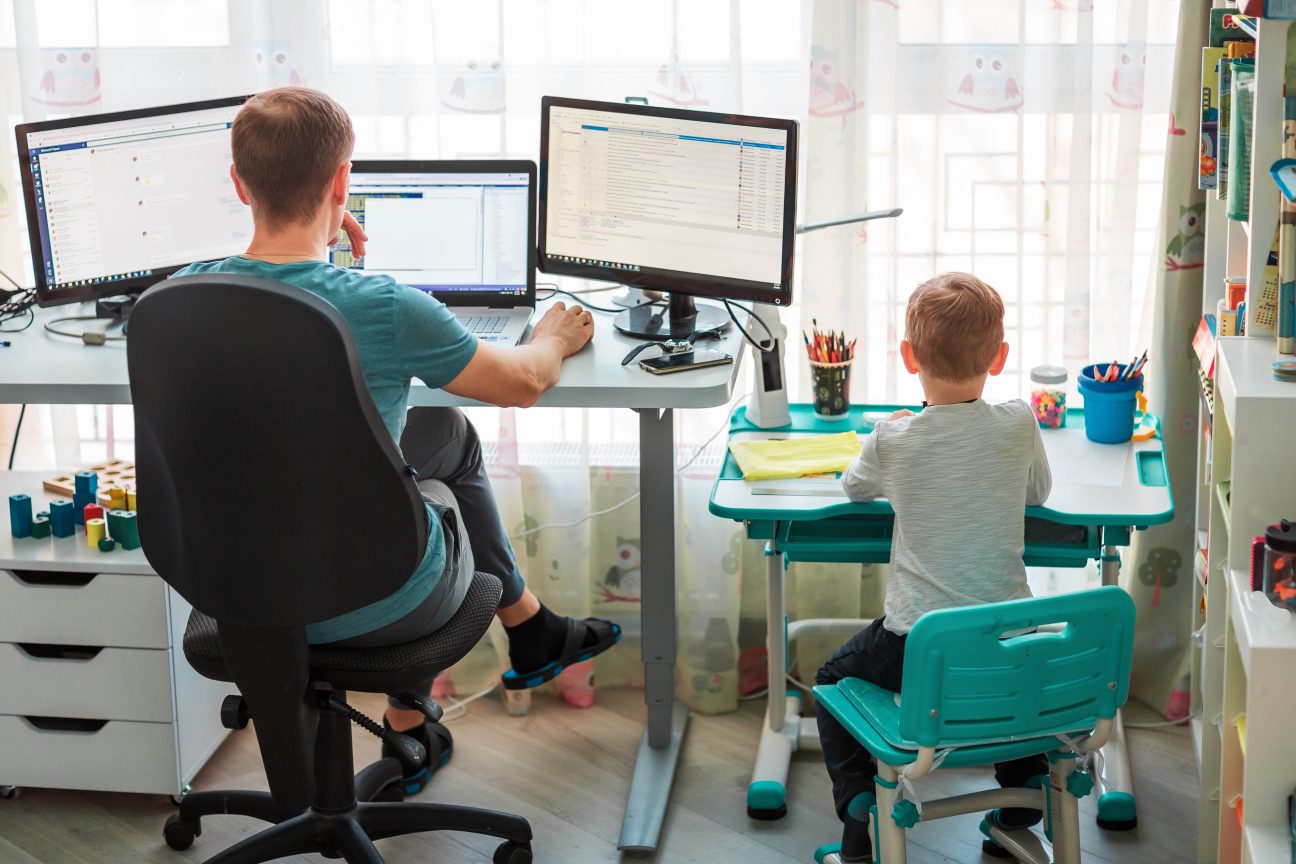The stigma over being a stay-at-home dad holds everyone back

- Men are taking on more home and parenting responsibilities than ever before.
- But stay-at-home dads continue to face the stigma of gendered stereotypes.
- By being more accepting of men in domestic roles, we further broaden gender empowerment throughout society.
Men should do their fair share around the house. It’s a common refrain in articles, on social media, and among the talking heads of daytime television. For good reason, too. Today, women make up nearly half of the U.S. labor force*, yet they remain disproportionately responsible for looking after children, aging parents, and any housework that doesn’t involve a lawn or car. It’s just one reason why working mothers are more likely to say parenting has interfered with their careers.
To give men their due, many have heard the message. Stay-at-home dads represent a growing number of at-home parents — 16% in 2012 compared to 10% in 1989 — and many more express a desire to be the house spouse. Men are also doing more chores than their grandfathers and taking on parental responsibilities like packing school lunches and scheduling work around sick days.
Not that their motivations are necessarily selfless. One study has suggested that men who do more housework are happier and less stressed. This may have something to do with another study’s findings: chore-mastering husbands enjoy a better and more active sex life. (Hey, whatever gets those recyclables out the door.)
Yet progress toward domestic equality has been modest. Simply put, men have yet to make strides into homelife to match women’s accomplishments in the workplace. Why is that? Does our male-dominated society still privilege men above laundry, dirty diapers, and wrapping the occasional birthday present? That may be part of it, but another reason is that we regard stay-at-home dads with more than their fair share of stigma and suspicion.
Mother knows best
Gender stereotypes have long held that parenting is not the purview of men. This perception has begun to shift, but Michael Kaufman, co-founder of the White Ribbon Campaign, points out that it’s only done so recently, mostly within our lifetimes.
As he told us in an interview: “I remember when my kids were young. (This was years ago.) If I couldn’t go out or do something or go to a meeting some night because I was looking after my kids, people would say, ‘Oh, you’re babysitting tonight.’ I’d be thinking, ‘I don’t babysit my own kids. I don’t help her out. I’m a parent.’”
“Well, that was still a bit unusual back then. But now, when I talk to young fathers, increasingly they are saying, ‘I’m striving to be an equal parent. I’m striving to take on half of the care work in my home.’”
Stay-at-home dads are becoming a more common sight on the playground sidelines. Even so, they aren’t viewed as capable as women on the home front.
According to Pew Research Center data, about half of Americans feel mothers do a better job at caring for babies (compared to 8% for fathers). Among adults who believe the ideal family setup is for a parent to stay home, 39% said the mother should be that parent (compared to 5% for stay-at-home dads). And almost a quarter of those surveyed contended it’s more important for babies to bond with mom than dad.
Stay-at-home dads, not cads
Much like when women entered the workforce, today’s stay-at-home dads face stereotypes. In this case, ones that paint unemployed men as feckless, unintelligent, childish deadbeats. The inept father is a sitcom staple today thanks to this rationale. And even in the era when father knew best, parenting was not dad’s strong suit. His style was seen as distant and worldly, offered with a sharp glance over the edge of the evening newspaper (or a hand on the shoulder if he was especially affectionate).
Gendered expectations like these may explain why, in a Salary.com survey, about a quarter of women said they refused to support a spouse who cared for the house and kids (compared to 8% of men). They can also lead people who would be a support system for mother-led homes, like grandparents and local parenting groups, to be less supportive of father-led ones. And they create a culture where stay-at-home dads must struggle with their sense of self-worth and inadequacy due to a minority status and lack of positive role models.
Such expectations extend into the professional realm with injurious results. Men who request family leave are viewed as weaker and lacking in certainty, putting them at greater risk of being penalized or let go in times of downsizing. Men who take an absence to care for family receive more negative performance ratings than women who opt out for similar reasons. And professions that typically deal with mothers are likely to view stay-at-home fathers with implicit biases. To pick one example, fathers are less likely to be checked for perinatal depression.
All this despite reams of research showing that fatherly involvement correlates with a bevy of benefits in children’s lives.

A new definition of parenting
With all that said, it’s also worth considering how family arrangements and parents’ self-identity have changed faster than our ‘50s-based terminology can keep up.
The U.S. Census Bureau estimates that for a quarter of married couples with children under 15, the mother takes on the at-home label. That’s compared to only 1% of stay-at-home dads. But note that the Census Bureau defines a stay-at-home parent as one who is “out of the labor force” to care for home and family.
That’s simply not the reality for many families today. In nearly half of two-parent households, both parents work. Many “at-home” spouses pursue side gigs or part-time work opposite their partner’s shift to supplement the family finances. Given that, the Census Bureau likely undercounts the true number of stay-at-home dads (and moms). Its definition simply isn’t up-to-date with many people’s lived experiences.
That’s why the National At-Home Dad Network advocates we change our cultural understanding of what it means to be a stay-at-home dad. The network believes the label belongs to any father who is the primary caregiver of a child under 18. Employment status should have no bearing on someone’s status as a parent. The same is true for mothers, too.
Such a change may get the numbers closer to how parents actually relate to the act of parenting. Returning to Pew data, a 2015 survey found that dads are just as likely as moms to say parenting is both rewarding and an important part of their identities.
As Kaufman told us, “[It’s] not about men losing, but about the ways that rethinking, reconstructing, rebuilding men’s lives is going to bring enormous benefit to [everyone].”
A rising tide lifts all (relation)ships
None of this is to say that more men can’t step up, help out, and take those recyclables to the curb. It’s not to say that women are to blame for the challenges facing stay-at-home dads or that they need to check their own privileges. It’s not even to say that all-out acceptance of at-home men will result in perfect gender parity. (Countries that rank as the most equal, such as Iceland, still exhibit a gender-equality paradox in which men and women on average pursue sex-typical work.)
It is to say that gender stereotypes can harm anyone, especially when they impose limitations on people. Men entering the home shouldn’t be chastised; they should be championed as we wish women to be when they enter the workforce.
By reexamining our expectations, for both men and women, we can bring enormous benefits to families and society as a whole. We can support parents in their choice to build the relationships and lives they need — regardless of whether that arrangement meets some past era’s ideal or even metrics that we find aesthetically pleasing. It’s about individual fulfillment and giving people the support they need to realize their life’s potential. Whatever and wherever that may be.
Learn more on Big Think+
With a diverse library of lessons from the world’s biggest thinkers, Big Think+ helps businesses get smarter, faster. To access Michael Kaufman’s full class for your organization, request a demo.





